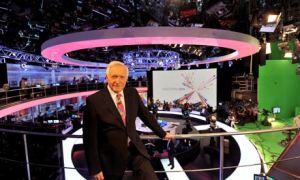It is a rare occasion but when it does happen it creates a ‘sit up and listen’ attitude amongst viewers. Newsflashes have been around for the best part of nearly seventy years across the globe, bringing viewers a breaking story. Conveying drama, theatre and enigma, these broadcasts have exposed the very best of television journalism. An ITV documentary, ‘Newsflash’, looked back at the era of when breaks in schedules were the order of the day. But in the day of 24 hour news and social media, is this concept now at risk of becoming a past tradition?
ITN’s Julie Etchingham narrated the insightful documentary and it certainly proved to be a hit amongst viewers. Newsflashes go beyond providing impartial information to the mass audience. In the documentary, the emotions of some of the most iconic journalists in the British industry were apparent. Martyn Lewis’ crackling voice when announcing the death of Princess Diana and Alastair Stewart’s real upset when discussing the Lockerbie bombing made it clear that journalism goes beyond collating the facts of a breaking news story. It is a real human life story. Having the responsibility of breaking such heart-rendering news is surely difficult. If anything, the emotion portrayed through our journalists, highlights how real journalism is. Such emotion can never be conveyed through social media.
The death of Queen Elizabeth the Queen Mother in 2002 and the invasion of Iraq are perhaps some of the last major stories to justify newsflashes before the emergence of online media. Social networks such as Twitter now announce breaking stories before they can even reach the airwaves. Online, news corporations have their own websites, which act as a 24 hour service to millions of users, as do mobile phone apps. Today, there is no need for newsflashes, since all of our breaking stories are available on demand 24 hours a day. However, there is still something very special about breaking into ordinary programming to bring viewers unfolding and at times dramatic footage.
The most recent unfolding event was that of the birth of the Royal Baby. Even I have criticised the enormous amount of coverage given. Yet, when looking back, the unfolding enigma and theatre on the steps of the Lindo Wing at Paddington was far from a boring and un-interesting broadcast. From the announcement of the birth to the moments the new parents and their child left the hospital, the world and its media followed extensively the story break. Like many others who have spoken, the extended newsflashes on public and commercial broadcasters were gripping. There was something genuinely exciting about seeing first-hand the pictures of our new heir to the throne. The joy amongst journalists, including the BBC’s Peter Hunt and ITV’s Tim Ewart, was clear; both channels rushed to get the best images and best guests to keep viewers on side. Dedication, passion and heart for a story you simply cannot grasp from an online piece of journalism.
It is incredibly easy to understand that this and so many other stories of recent times could have simply unfolded online. The majority have access to a computer system. But that is not how journalism works. Online journalists are some of the best in the business, but journalism is about connections. Connections with guests, connecting with the story and connecting with the viewer. Television is a great medium to achieve the outcome of this formula. Television is a truly remarkable source of creating tension, creating drama and creating the news. Despite how many may ‘retweet’ or comment on a story, there is little excitement and sense of importance created.
Whilst I openly support television journalism, is there any evidence to suggest that soon social media will be the clear dominant force? There is clear evidence to suggest that social media is heavily breathing down the neck of our television journalists. On the BBC’s Breaking News Twitter account, there are over 7.7million followers. That is close, if not more, than the average rating for one of the main BBC One news bulletins. For those who don’t follow a news service account or attempt to avoid news online, it is a very difficult position. Given the amount of retweets per tweet made, nearly all users on Twitter are exposed to some form of news and information.
I readily admit that I use social media to keep up to date on news. Whether I’m working, away or elsewhere. But there is something quintessentially isolate about a computer generated piece of news. Yes, there is somebody at the other end inputting the news, but they are not a familiar face. The beauty with television journalism is trust. Many journalists have been on screen for years and build rapports with viewers. As you read a tweet about breaking news, it is objective and distant. If the BBC’s business expert Robert Peston announces a breaking piece of financial news, viewers trust his words, they understand and relate to his words, because of his familiarity.
The ‘Newsflash’ programme highlighted much of the programmes that have literally stopped people in their tracks. The September 11th Attacks, The Gulf War and the death of Michael Jackson, amongst others. There is something very special indeed about a breaking news story. It is very difficult to explain, but television journalists do a grand job of keeping viewers informed and enticed. On that note, television journalism still remains at the top of its game. Social media is a convenience but broadcast journalism brings reality and humanisation to a gripping theatrical piece of news.
Visit the ITV Player to see ‘Newsflash’ narrated by Julie Etchingham




